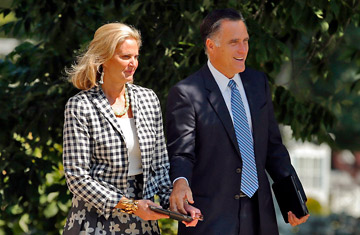
Romney and his wife Ann leave the Church of Jesus Christ of Latter-day Saints near their lake house in Wolfeboro, N.H.
(5 of 6)
Romney's personal engagement in charitable works is formidable. The Mormon church requires its members to tithe 10% of their income to maintain good standing in the church. He and his wife are generous donors: in 2010, the Romneys gave $3 million to charity, $1.5 million of which went directly to the church. The church runs more than 300 employment-resource centers and 80 family-services offices. Some 9,800 missionaries work in welfare services, teaching English as a second language, improving agricultural and medical practices and distributing clothing. The LDS church encourages members to keep a three-to-six-month food supply in reserve so the faithful won't go hungry in case of a natural disaster. Mormon families also forgo two consecutive meals a month and give the money that would have been spent as a "fast offering" for the poor. Local bishops--a position Romney held in Massachusetts, where he eventually led several thousand church members--work with members of their wards to overcome economic challenges. Bishops can even pay a family's mortgage while spouses look for jobs. With fast offerings and tithes, the Mormon system is designed both to make members self-reliant and to follow the biblical mandate to feed the hungry and clothe the naked.
So we know how Mormons feel about caring for other Mormons. What about reaching out to others? And what is the proper role of government in caring for the least of these?
As a young man in the 1960s, watching his father campaign for President amid the rise of Lyndon Johnson's Great Society, Romney heard warnings about an overly paternalistic government. "Under the Great Society, a gap is growing between government and people," his mother Lenore said in a fundraising speech in 1967. "Government is becoming 'they,' not 'we,' 'theirs,' not 'ours.' Instead of encouraging us to be our brother's keeper, it tells us to relax because we've hired a keeper for our brother. It tells us that government will not only keep our brother, but government will be our keeper too ... Americans are not by nature a 'kept' people."
Mitt would agree with his mother but would not rule out a role for government, if a more limited one than Democrats favor. "My faith is grounded in the conviction that a consequence of our common humanity is our responsibility to one another--to our fellow Americans foremost, but also to every child of God," Romney told Cathedral Age. Still, he has a Mormon's dislike of the idea of a dole. Within the church, those receiving help have to give something back too; dependence is to be avoided, though generosity is essential. It is, if you will, a pragmatic way of looking at the matter.
With only weeks to go before the election, the question is whether Romney has the capacity to draw once more on the pragmatic tradition of his religious forebears. Will he stick with a strategy that seems not to be working against President Obama, or will he respond to changing events--in this case, falling poll numbers in key swing states--with bold policy proposals or a more overtly negative campaign or whatever might move the election in his favor?
